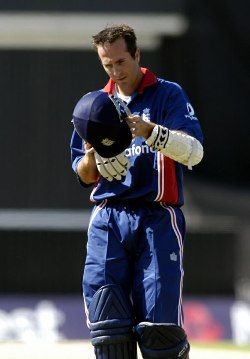An English Ending
Martyn Corrin |
Sir Alf Ramsey is highly regarded in England. He led the England football team to World Cup glory in 1966. The FA sacked him in 1973 shortly after his side failed to qualify for the 1974 World Cup. Sir Clive Woodward is pretty famous as well; he led the Rugby team to a monumental triumph on the world stage in 2003. He then oversaw the beginning of a dramatic decline in the England side, before resigning in September 2004 and taking control of a disastrous British Lions tour. How about another? Linford Christie, you might have heard him, ruled the 100 metre sprint world from 1992 until 1994. His international career ended in disqualification at the 1996 Olympics for two false starts in a race he would probably have finished 6th or 7th in. And he went on to fail a drugs test when running as a retired athlete at an indoor meeting a few years later. The English don’t do “going out on a high”, it’s not for us. Sadly, alongside Ramsey, Woodward and Christie (and countless others) you can place Michael Vaughan, former England captain.
Does it sound weird, “former England captain”? I am not quite sure. It still hasn’t completely sunk in that it’s Kevin Pietersen that will be running the show, but the idea of Vaughan being gone, it’s not all that odd. You knew he wanted to lead the side until the 2009 Ashes, and that he’d never go on past that, but really, we had a whole year where he wasn’t captain, and this time round it always seemed like he could be on his way any minute. Just three weeks have passed since his resignation yet there was a sense of inevitability about it.
“He was probably saying to himself: ‘Vaughany was telling them to do one thing two weeks ago and now it’s me telling Vaughany and all the other guys to do something different.’ You could tell he didn’t feel comfortable…” wrote Michael Vaughan in his captaincy book Calling the Shots back in 2005. The writing for Vaughan, in all reality, was on the wall in 2007 when he stepped down from the one-day captaincy. It was in effect an admission that he was relinquishing a part of his power base – anybody who has read the aforementioned book would surely have had Vaughan’s words in mind when Paul Collingwood began to lead out the one-day side, and Vaughan himself confirmed as much in his resignation conference, when he stated that he felt the captaincy is best off united (even though it wasn’t Collingwood who ended up taking the job on).
Another telling quote from the same section of the book sees Vaughan saying, “Nasser scored one. I felt for him. It’s horrible as captain when you don’t get runs and you’re still trying to demand respect from the team.” Vaughan has had rough patches with the blade before; the only thing which spared him an embarassing average in the glorious summer of 2005 was one fine innings at Old Trafford (where he scored 166). It did not matter. He was leading out a successful team, most of the country weren’t paying attention to how many runs Vaughan scored, he had Strauss, Trescothick, Pietersen and Flintoff to do that for him. But when the team aren’t performing, eyes turn to the captain, and in this instance, the captain has turned away.
Let us not dwell, though, on the negatives that have surrounded Test Cricket in England recently. Michael Vaughan did not deserve his legacy to be three series defeats in his last five but that is what he delivered. Yet let’s look at the bigger picture; a 51% win rate, just 11 losses from over 50 matches, and some of the best times English cricket fans can remember. There were plenty of highs, lows and maybes during the Vaughan era. The most commonly held view seems to be that he is the greatest skipper the nation has ever had. In itself the debate as to who is the greatest skipper is for another time. How good was Vaughan, though?
There is no doubt Vaughan got a bit of luck; there were foundations laid in the Hussain era that Vaughan built upon, and he inherited a pool of players who were on the most part just about to have the best periods of their careers. Hussain took the side out of the rollercoaster decade that was the 1990s and turned them into a respectable side, the highlights being wins in both Pakistan and Sri Lanka in 2000-01. This brings me to one of the stains on Vaughan’s record; the only time he won on the subcontinent in Tests was away to Bangladesh. He led us to two 1-0 defeats in Sri Lanka, a 2-0 defeat to Pakistan (though he only skippered us in one of the defeats) and did not lead us into India, where we enjoyed our best Test series in Asia since Hussain’s days; pretty much Andrew Flintoff’s only golden days as captain. Struggling on the subcontinent is something that any side that wishes to be great must avoid doing and as such you can argue that Vaughan’s England side never earned the great tag that many attributed to them.
On top of this, Vaughan never got the chance to lead his side out in Australia. It is a tantalising thought to think what might have been had he done – Australia were so brilliant in 06-07 that it would have been hard to see supernatural intervention stopping them from taking the Ashes back. But something that it’s hard to ever picture Vaughan doing is leading an England side out to such a shambolic series of defeats. His lowest point as England captain was surely the atrocious display on his home ground earlier this summer, where Vaughan, Darren Pattinson and nine others went down by ten wickets, somehow miraclously avoiding an innings defeat. Vaughan did suffer a couple of those whilst wearing the armband but nothing was quite as demoralising as the way England lost to South Africa in that Test. Nonetheless, even in that particular game there was much more spirit than was there as England were bullied at Brisbane, imploded in Adelaide, as Gilchrist hit them all the way to Antarctica in the Perth Test – in that game England started well, bowling the Aussies out for under 300 before giving up the Ashes in a way that the old candy from a baby metaphor would do no justice. And I’m not even going to start on the shambles of Melbourne and Sydney but it’s hard to picture Vaughan’s sides going down so easily.
Yes, it is easy to look at what Michael Vaughan didn’t achieve as skipper, he never led them to a true Test Series victory in the subcontinent, he never led them out in Australia. But this is hardly a fair way of looking at things. Michael Vaughan was officially the England Test captain from July 2003 until August 2008. In this time the four greatest challenges that the England side faced were South Africa away, India away, Australia at home, Australia away, in reverse order. Vaughan was injured when England went to India and Australia, leaving Andrew Flintoff to lead out the side. The other two challenges? Do you really need reminding?
Many people said ahead of the South Africa series that the only way England could win is if Vaughan scored runs, runs, runs and Harmison took a hatful. Neither of those happened, Vaughan’s series was mediocre (as a batsman) and Harmison had a disastrous time. Strauss and Hoggard were the key components as far as batting and bowling went. But this series best showcases Vaughan’s captaincy. The fourth Test at Johannesburg was truly memorable, but it seemed to be heading for a surefire draw when Vaughan kept his side batting into the fifth day; he didn’t have much choice and ended up setting South Africa 325 from 68 overs. He was criticised for this at the time, it was seen by many in the commentary box as too negative. What unfolded was a fantastic display from Matthew Hoggard who took seven wickets. Vaughan set the right fields and he did that really simple thing – he let the bowler who was bowling best bowl the most. We saw this tactic pay off many times, we saw it when Andrew Flintoff stormed in on a marvellous Sunday morning at The Oval in September 2005, we saw it early in 2004 as he let Harmison rip through the West Indies, sticking eight slips in for the big man. Vaughan was a proactive captain, his bowling changes brough a wicket so often but he wasn’t afraid to be reactive if he saw that it would bring results. Vaughan had a plan, he knew what he wanted to do, but the old style six over spells were not seen as a rule by Vaughan. He went with the flow.
He also received a lot of credit for his inventive fielding positions. He would put men where he felt they would catch the ball, where he felt they would stop the ball. Two of the finest examples of Vaughan’s captaincy in the field came during the second Test against Australia in the 2005 Ashes. Early in the Australian innings he put a man (Andrew Strauss) in short on the drive for Matthew Hayden, he was almost saying “hit it there Matty, you know you want to.” And oh, how he did, first ball. More interestingly, though, later in the game he didn’t crowd the Australian batsmen as England went desperately after the elusive final wicket. I will never forget my heart popping out of my mouth, as Brett Lee hit a shot that was always, always, always four. But Vaughan wanted to make sure that Australia would have to score singles or risk going over the top, it was brave as there were gaps to be found, but there were four needed when Ashley Giles intercepted Lee’s shot. One run later it was all over.
Vaughan was never afraid to push the boundaries as England skipper. He took a lot of influence from Stephen Fleming with regards to captaincy, but also wanted his team to learn from Australia. To be the best you need to imitate the best; he wanted his teams to get into the faces of other sides. The aforementioned tactic of giving Steve Harmison eight slips in the West Indies is something a more conservative captain would shy away from; Vaughan “couldn’t see the ball going anywhere else.” It was reactive captaincy at its best, it was daring, it was right. Similarly, he switched Hoggard and Harmison round for the opening over of the 2005 Ashes, previously Hoggard had bowled the first over, but he wanted the Aussies to have a hostile beginning. And of course there is the recent revelation that Marcus Trescothick sucked on Murray’s Mints throughout the series to help with the shine of the ball. This in addition to England’s constantly liberal and controversial use of substitute fielders. These are tactics which push the spirit of cricket to its limits. Ricky Ponting was hugely castigated early in the year for Australia’s lack of respect for said spirit, the way they pushed the limits may have been different but the same principles apply; Vaughan may well have started pushing boundaries because he wanted his side to behave like Australians but it wouldn’t be a wild suggestion to imply that Ponting was pushing his side in the same direction as the last side to beat them, that he learnt a lot about the type of skipper he wanted to be when he brought his team to England’s shores three years ago.
During the first ODI of the England-South Africa series, Sky Sports showed an interview with Michael Vaughan in the innings break. He was very frank, and said he feels he can become one of the best batsmen in the world again. He said he didn’t bat to his maximum as captain, and the undertone for me was that he didn’t have any more to give, he put so much into his captaincy. But it was worth it, it was worth sacrificing someone who was ranked as the best batsman in the world to beat the best in the world, to be a consistently successful side for a couple of years. Whenever Vaughan wasn’t scoring runs, you’d still want him in the Test side ahead of someone who could guarantee you fifty more runs than him because with Vaughan at the helm no match seemed a lost cause until the end. Sadly, it was no longer worth it when we were losing at home to South Africa, away to Sri Lanka. Then, his time was up, but his legacy isn’t ruined. He brought English cricket’s greatest sustained spell in a generation; it might be Kevin Pietersen or Andrew Flintoff that young boys want to be like but it is because of Vaughan’s brilliance that these young boys know who those men are.
Sir Alf Ramsey may not have deserved to go on the FA’s terms, but no England manager will ever survive not qualifying for the World Cup. With hindsight, he probably would have gone earlier, maybe after the 1970 competition. Sir Clive Woodward would probably take the lead of large parts of his team if he had his time again, and call it a day with the cup safely won in 2003. Linford Christie’s time was gone anyway when he double false-started; the disqualification was the best thing that could have happened to him in many ways as it spared him the ignominy of a sixth, seventh or maybe even eighth placed finish. Yet if you ask the average England supporter when Vaughan resigned, they largely would tell you that he was still the best man for the job, that the side would be worse off without him in the side and if they could have anyone to lead them into the 2009 Ashes it would be Vaughan. Well, what England fans can hope for now is for Vaughan to return to his glorious batting form of his pre-captaincy days, when he averaged over 50. There are tough times ahead for England in Test Cricket, India and a resurgent West Indies away, Sri Lanka and Australia at home, and beyond that South Africa away. It’s hard to see him going past there, but if Vaughan can get it together, he can remind people why he used to be the top-ranked batsman in the world, why Australians still fear the thought of a batting line-up with his name in. If he gets it right, he can do that very un-English thing: finish on a high.





Top read Martyn. Really well written. Kudos.
Should have mentioned he’d have been no good without mints though :p
Comment by Burgey | 12:00am BST 28 August 2008